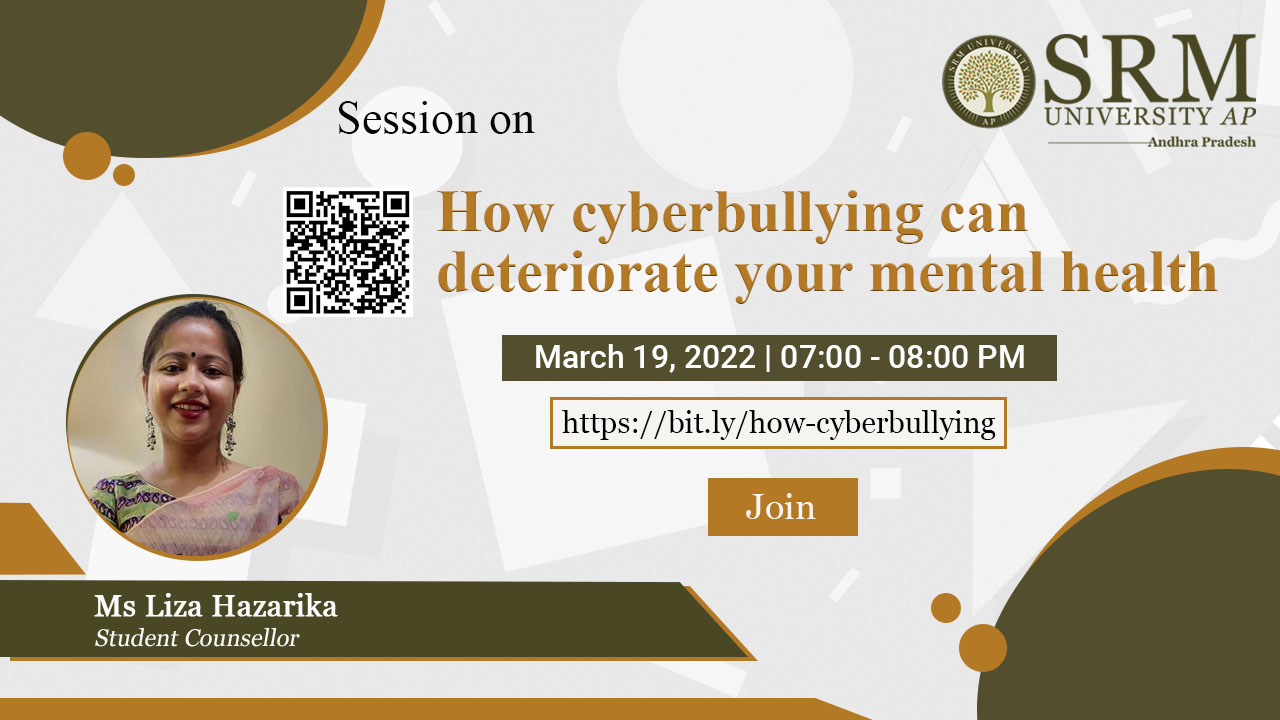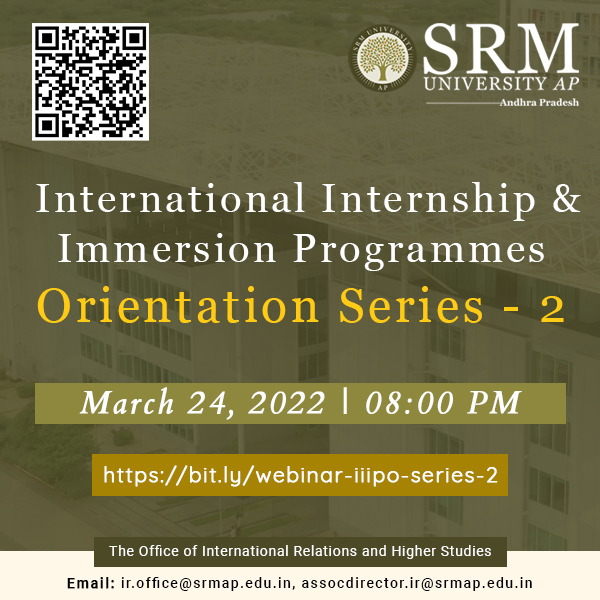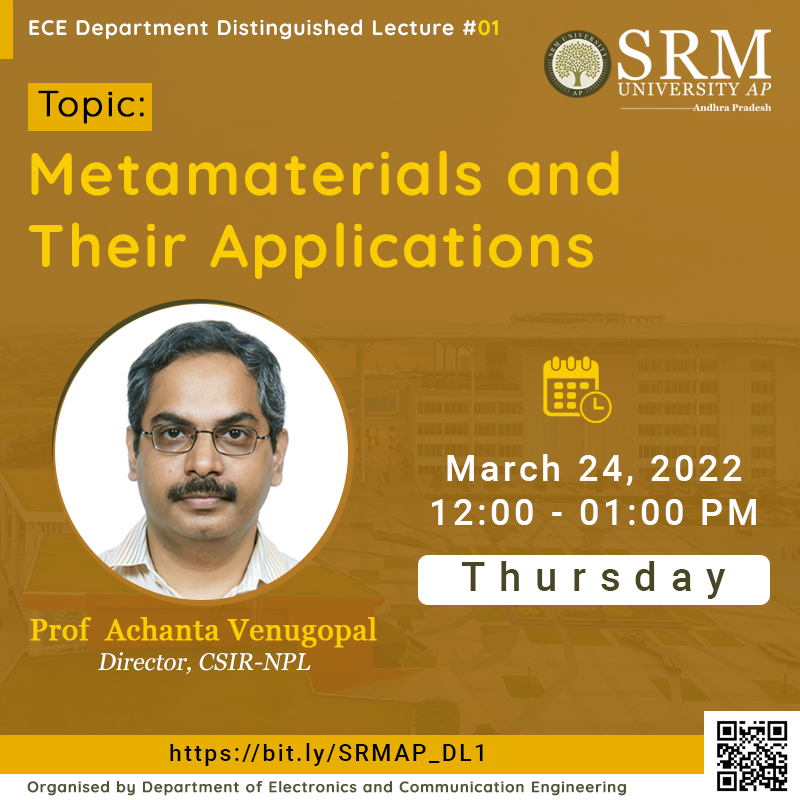To express innovative ideas of entrepreneurship and leadership
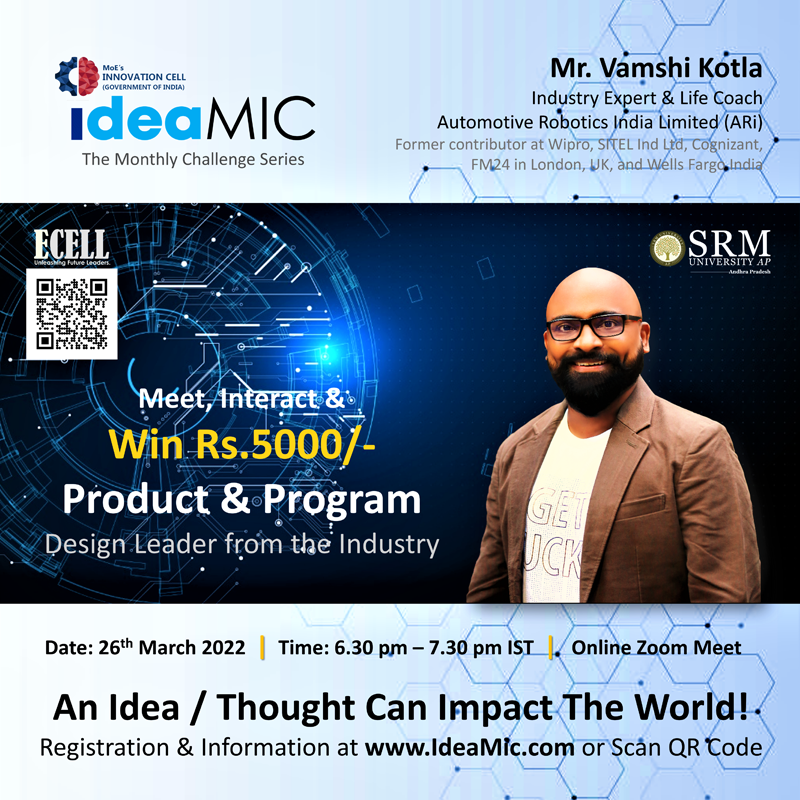
IdeaMIC is a platform to express innovative ideas of entrepreneurship and leadership. The Department of Entrepreneurship and Innovation at SRM University-AP, Andhra Pradesh, organises a webinar on March 26, 2022, at 6.30 pm. Mr Vamshi Kotla, Industry Expert & Life Coach, will be the day’s guest. He will judge the IdeaMiC (an idea pitch competition) and be the guest speaker for the event.
Every month top 10 ideas are allowed to be presented through IdeaMIC at SRM University-AP. The best idea is given an opportunity to enrol with Hatchlab Research Centre- a TBI of SRM University-AP, and the innovator can avail of all the benefits and support from the university. The best and novel idea of the month also gets a reward of Rs 5000 towards developing the prototype or implementation of the idea.
About Mr Vamshi Kotla
Mr Vamshi Kotla is an Industry Expert & Life Coach currently associated with Automotive Robotics India Limited (ARi). He was also associated with global brands and contributed immensely at Wipro, SITEL Ind Ltd, Cognizant, FM24 in London, UK, and Wells Fargo India.
Join the latest edition of IdeaMIC and pitch in your ideas on March 26, 2022, at 6.30 pm.
Register here for IdeaMIC: www.ideaMic.com
- Published in Events, IDEA Events
Cyberbullying and its mental impact
Cyberbullying has become an everyday menace facing the present society. The effects of such virtual world threats can be unfathomable. As an increasing number of people continue to fall prey to such harassment, it is a compelling necessity to raise caution against cyberbullying and spread awareness of the mental trauma it culminates in.
The Department of Student Affairs is bringing forth a productive session, How cyberbullying can deteriorate your mental health? with Ms Liza Hazarika to alert students on the psychological impact associated with cyberbullying and how to effectively deal with it.
Date: March 19, 2022
Time: 7.00 pm to 8.00 pm IST
Tune in for the webinar and learn to tackle cyberbullying without harming your mental peace.
- Published in Events, Students Affairs Events
Orientation: International internship and immersion programmes-II
With so many options, students are frequently puzzled when selecting a course, studying its scopes, and aligning themselves with the prerequisites for going abroad.
A webinar series on International Internship & Immersion Programmes is being organised by the Office of International Relations and Higher Studies at SRM University-AP. Interested students can gain a detailed overview of international programmes and their preparation procedures.
Date: March 24, 2022. Time: 8.00 pm
Join the second episode of this illuminating series and get one step closer to your ambition of studying abroad!
- Published in Events, International Relations, IR-Events
Metamaterials and their applications: Distinguished Lecture Series
The Department of Electronics and Communication Engineering is hosting the first segment of the ECE Department Distinguished Lecture Series on March 24, 2022, from 12.00 pm to 01.00 pm IST. Prof Achanta Venugopal, Director, CSIR-NPL is the distinguished speaker of the event. He will be delivering a talk on the topic “Metamaterials and their Applications”.
Abstract of the Talk
Metamaterials are designed materials with unique properties that may not exist in naturally available materials. These are designed with sub-wavelength size components. In this talk, after briefly introducing metamaterials, the speaker will discuss on a few metal-dielectric and all dielectric metamaterials and their applications in wide-ranging areas covering stealth, single-photon emitters, reusable biosensors among others.
Speaker’s Profile
Venu Gopal Achanta obtained his PhD in Physics from Tata Institute of Fundamental Research, Mumbai and PhD in Electronics from Tokyo University, Tokyo, Japan. He is currently the Director of CSIR-National Physical Laboratory, Delhi. He is on lien from Tata Institute of Fundamental Research, Mumbai where he is a professor in the Department of Condensed Matter Physics and Material Science. He has served in various TIFR committees as chair and member. He is also on the senates of IISER, Berhampur and IIT, Delhi. He is a member of the executive council of Optical Society of India, vice-chair of IEEE Photonics Mumbai chapter and member of the program committee of the Association of Asia Pacific Physics Societies – Division of Condensed Matter Physics. He is on the editorial board of journals, Scientific Reports, Frontiers in Physics, Encyclopedia of Applied Physics, and the Indian Journal of Pure and Applied Physics. He is an honorary Fellow of the Metrology Society of India and senior member of IEEE. His research interests are in nano and quantum photonics with over 140 journal publications.
Join here for an insightful session with Prof Achanta Venugopal.
- Published in Departmental Events, ECE Events, Events, Webinars
Raise yourselves up with the rising industrial expectations
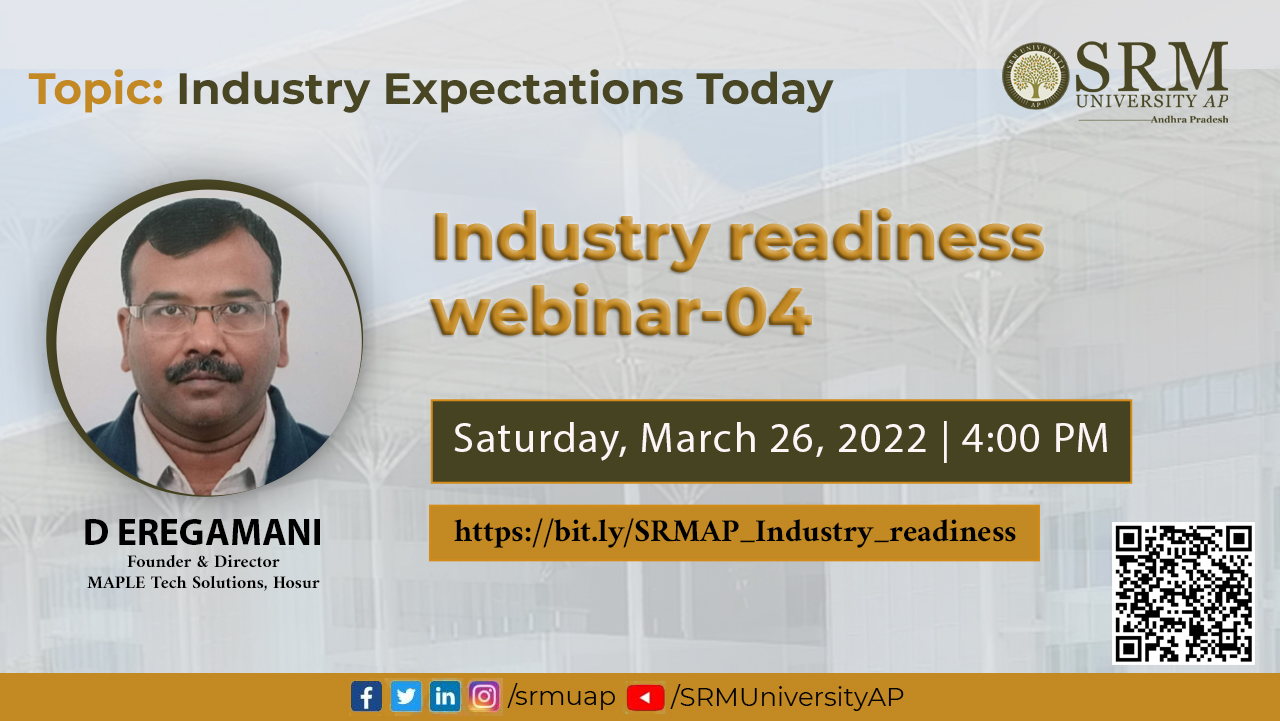 The modern business landscape is experiencing sweeping changes with each passing day, and so do the expectations in the field. Giving lessons on cutting-edge industrial practices is the need of the hour. Students should be levelled up to remain competitive in entrepreneurship and trained to keep abreast of the latest industry trends.
The modern business landscape is experiencing sweeping changes with each passing day, and so do the expectations in the field. Giving lessons on cutting-edge industrial practices is the need of the hour. Students should be levelled up to remain competitive in entrepreneurship and trained to keep abreast of the latest industry trends.
The Department of Corporate Relations and Career Services is bringing forth the fourth session of the Industry Readiness webinar series on the topic “Industry Expectations Today” to give the students an extended perspective on present-day expectations in the business world.
Date: March 26, 2022
Time: 4.00 pm IST
About the Speaker:
Mr D Eragamani is the founder and director of Maple Tech Solutions, Hosur. He has 28 years of wide-ranging experience in the industrial domain. Mr Eragamani has worked as the Head of Manufacturing &TQM with major Corporates such as Titan Industries Ltd, Tyco group, TERUMOPENPOL LTD and Murugappa group.
Currently, he is running a consultancy and imparting training to industries and startups. He has gathered expertise in training by conducting workshops for MSMEs and Startups on Leadership, Business Model Canvas, Improving Leads and Digital Marketing. He has guided and judged several Quality Circle competitions.
Mr Eragamani also had the opportunity to work as an adjunct faculty in VIT School of management, NIT school of management, INDUS Business Academy, IIM-Bangalore etc. He is a member of various reputed organisations such as QCFI – Governing Council Member, Hosur Chapter; ICT Academy, Chennai; MMA, Chennai and many more. He has received numerous awards and accolades including the QCFI Platinum category award at the International forum, Taiwan and the Business Excellence award for TITAN.
Join Mr D Eragamani for a productive session and augment your possibilities of getting placed with leading companies.
- Published in CR&CS, CR&CS Events, Events


